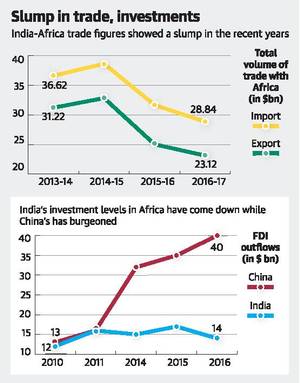Background:
- India was a key partner of African nations in the 1950s and 1960s.
- However in the past decade, India lost influence in Africa to China and other Asian nations.
- In recent years, India is seeking to broaden its general outreach to resource-rich Africa and establish its footprint in sub-Saharan Africa.
- India has positioned itself as a partner of choice to African countries in areas such as education, healthcare, investment and trade.
- In 2014-15, India-Africa trade was almost $70 billion and Indian investments in Africa in the past decade was amounted to $30-35 billion.
- The figures, however, are low in comparison with the Africa’s trade and investment ties with China which is around $200 billion.
- China has built large infrastructure projects like roads, railways, airports and government buildings in Africa.
- Together, President Pranab Mukherjee, Prime Minister Narendra Modi and Vice President Ansari have visited 12 African nations in 2016.
- This was in keeping with PM Modi’s promise to maintain the tempo of interaction with Africa, made to leaders to 54 African nations during the 3rd India-Africa summit in New Delhi in October 2015.
- The presence of Indian private sector in Africa is noteworthy and amounts to USD 35 billion investment made in the sectors like automobile, drugs and pharmaceuticals, textiles, IT services, water treatment, petroleum refining etc.
- As opposed to China, India is more oriented to improve local capacities in Africa. For instance, India’s EXIM Bank has helped incubate similar institutions in five African countries.
- India and Japan have unveiled a vision document for the Asia Africa Growth Corridor, proposed by the Prime Ministers of the two countries last November. Asia Africa Growth Corridor is conceived as a more open and inclusive programme that will be based on more consultations and keep people as the centre piece rather than just trade and economic ties.
General
- India-Africa have socio-economic similarities
- Colonial History
- Similar developmental profile
- Similar challenges
- Both are complementary too
- India’s growing need for African commodities
- Africa can use India’s technology & spirit of Jugaad
- However growth in relationship has been slow
- Africa economic rise due to
- An improving political governance
- A rapidly growing population
- Urbanisation
- A better educated and skilled workforce
- New Delhi exports consumer and capital goods and medicines to Africa. India-Africa trade was worth almost 70 bn in 2014-15 and India companies invested 30-35 bn in the continent over the past decade
- India’s major contribution in UN peacekeeping forces in Africa.
Challenges:
- China is emerged as Africa’s largest trading partner
- China’s current hold in trade and investment in Africa is three times India’s
- Africa today has no dearth of friends and its engagement with global powers is more pragmatic, devoid of the ideological trappings of the Cold War period. Thus India has to find a way to raise its profile and ensure that its age-old ties with Africa get a modern outlook

Other Facts/Issues:
- At present, almost 6000 Indian soldiers are deployed under UNPKF across Africa and 159 died over the years.
- DFTP (duty free tariff preference scheme)
- Genesis in 2008 India-Africa summit
- Unilateral duty free market access which India has provided to all least developed countries including 34 in Africa
- Provides deeper market access
- Since amendment in 2014 – coverage has gone beyond 98% of India’s total tariff lines
- India is the fifth largest investor in Africa.
- The Union Cabinet has approved opening of 18 new Indian Missions in Africa over four year period from 2018-2021. The decision will enhance India’s diplomatic outreach.